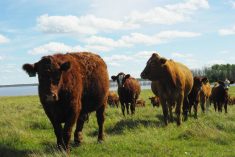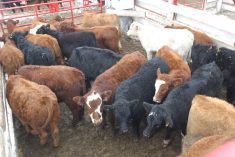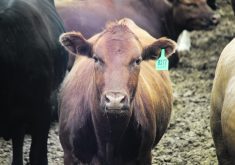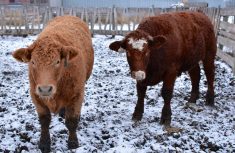Group shows budget deficit | Declining checkoffs put Alberta Beef Producers in the red
EDMONTON — A dwindling cow herd and a refundable checkoff have created a dire financial situation for Alberta Beef Producers, once the envy of farm groups across the country.
For the first time in history, the provincial cattle organization has not been able to pay its share to the Canadian Cattlemen’s Association, and it was forced to dip into a reserve fund to meet its budget.
John Buckley, finance chair, said the $5 million budget would need to be trimmed more if money raised from the checkoff continues to decline.
Read Also

Beef check-off collection system aligns across the country
A single and aligned check-off collection system based on where producers live makes the system equal said Chad Ross, Saskatchewan Cattle Association chair.
“We are in a very tenuous situation with our funding,” said Buckley during the group’s summer meeting.
At the end of the 2013 budget year, the organization received about $538,000 less revenue than expenses. At the end of 2014, it has projected a $754,000 shortfall.
“The tools we used in the past to predict how many marketings we received have not been reliable for the last couple years. We are in a declining revenue situation and we don’t have the assured level of funding we once had. It is a huge challenge,” said Buckley.
From April 30, 2013 to March 31, 2014, 3.7 million cattle were marketed in Alberta, up from 3.4 million in the previous period.
In Alberta, a $3 checkoff is charged each time an animal is sold. Of that, $2 is refundable and $1 is paid to a national beef promotion and research agency and is non-refundable.
Four years ago the checkoff was made refundable, which enables producers to apply to have some or all of the refundable portion returned.
In 2013, Alberta Beef Producers received 923 refund requests worth about $2.4 million.
The agency kept $4.6 million, but it is retained in a special account until the following year.
“We will have very serious decisions to make to get the best value for our producers,” said Buckley.
ABP chair Greg Bowie said the splintered nature of the cattle industry in which various groups represent different interests, has also divided industry money, which prevents the industry from investing in research projects or taking on national beef and cattle advocacy.
Bowie said the drop in revenue means the trade advocacy reserve fund, which was set aside to fight trade disputes, will not be replenished.
“For the first time we had to pull funds from our operating reserve fund, which had been set aside to assist in getting the organization through the years when marketings are at their lowest,” said Bowie.
Northern Alberta cattle producer Gordon Graves wondered how long the organization could continue.
“It appears we are in financial difficulty. How long till we reach the breaking point,” he asked.
Larry Delver with the Cattle Industry Council of the ABP, said the group should find allies in the industry to help promote the group.
“We need to use our imagination to figure out who is on our side.
“We are presently in arrears in our payments to CCA for operations, but were able to meet the payment levels for this budget year. And probably the biggest problem is our inability to fund research and promotion at the level necessary to remain competitive with other exporting nations. We are appreciative of government funds used in these areas, but we need to be able to put up dollars to secure these matching funds.”
Buckley said while the provincial and federal governments have funds available for research and promotion, most require matching funds from outside interests.
“Our ability to match is restricted and becomes a difficult issue,” said Buckley.
It’s not just the cattle organization struggling. Bowie said producers wanting to enter the industry, or expand their herds also need secure financing.
“In order to add more cows, new and existing producers need affordable land and access to water and labour, all resources that are in short supply in Alberta.”

















